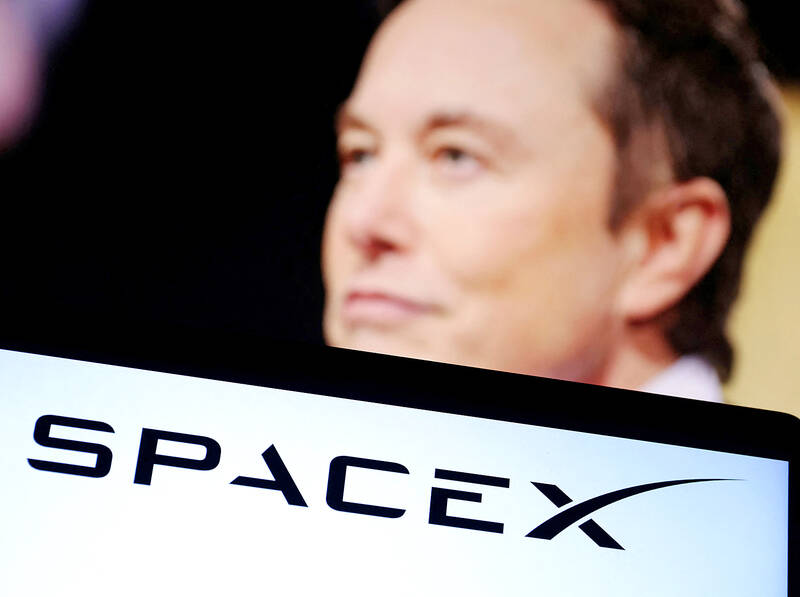Space Exploration Technologies Corp (SpaceX) might have contravened its Pentagon contract by not providing access to its satellite communication network Starshield in and around Taiwan, a letter from a US House of Representatives committee to the company said.
In September last year, the US Department of Defense awarded SpaceX a one-year contract for Starshield access, worth US$100 million. A few months before that, the Pentagon also commissioned SpaceX’s Starlink satellite network to be used by Ukrainian forces amid Russia’s invasion.
Starshield is a derivative of Starlink intended for military use.

Photo: Reuters
SpaceX has long worked closely with the US military and intelligence agencies, which contract the company to launch government satellites used for the transmission of sensitive and classified information.
US Representative Mike Gallagher, who is chairman of the US House Select Committee on Strategic Competition between the United States and the Chinese Communist Party (CCP), wrote the letter to company founder Elon Musk following Gallagher’s three-day visit to Taiwan that concluded on Saturday.
The letter was obtained by CNBC after Forbes magazine first reported on it.
In the letter, the Republican representative said the company’s contract with the Pentagon requires the US military to have global access to the satellite network.
“Multiple sources have disclosed to the committee that Starshield is inactive in and around Taiwan,” the CNBC report quoted the letter as saying, adding that it asks Musk to provide a briefing on the issue to the committee before Friday next week.
“In the event of CCP military aggression against Taiwan, American servicemembers in the Western Pacific would be put at severe risk,” the letter said. “Ensuring robust communication networks for US military personnel on and around Taiwan is paramount for safeguarding US interests in the Indo-Pacific region.”
Earlier this month, Ukraine’s top military intelligence official accused the company of providing the Russian military with Starlink services in occupied areas of Ukraine. Musk responded at the time that SpaceX would not sell Starlink terminal services to Russia.
Musk has also referred to Taiwan as “an integral part of China” and said he “knows China well.”
In 2022, Musk said in an interview with the Financial Times that Taiwan’s future could be resolved by Beijing through “establishing Taiwan as a special administrative region.”
CNBC said that Musk’s stance on Taiwan has allowed automaker Tesla Inc — of which Musk is CEO — to thrive amid rocky US-China relations, and Beijing to permit it to have its own factory in Shanghai, while other foreign automakers in China are required to set up joint ventures with Chinese companies.
SpaceX and Musk did not immediately respond to requests for comment on Gallagher’s letter.

PREPAREDNESS: Given the difficulty of importing ammunition during wartime, the Ministry of National Defense said it would prioritize ‘coproduction’ partnerships A newly formed unit of the Marine Corps tasked with land-based security operations has recently replaced its aging, domestically produced rifles with more advanced, US-made M4A1 rifles, a source said yesterday. The unnamed source familiar with the matter said the First Security Battalion of the Marine Corps’ Air Defense and Base Guard Group has replaced its older T65K2 rifles, which have been in service since the late 1980s, with the newly received M4A1s. The source did not say exactly when the upgrade took place or how many M4A1s were issued to the battalion. The confirmation came after Chinese-language media reported

The Taiwanese passport ranked 33rd in a global listing of passports by convenience this month, rising three places from last month’s ranking, but matching its position in January last year. The Henley Passport Index, an international ranking of passports by the number of designations its holder can travel to without a visa, showed that the Taiwan passport enables holders to travel to 139 countries and territories without a visa. Singapore’s passport was ranked the most powerful with visa-free access to 192 destinations out of 227, according to the index published on Tuesday by UK-based migration investment consultancy firm Henley and Partners. Japan’s and

A Ministry of Foreign Affairs official yesterday said that a delegation that visited China for an APEC meeting did not receive any kind of treatment that downgraded Taiwan’s sovereignty. Department of International Organizations Director-General Jonathan Sun (孫儉元) said that he and a group of ministry officials visited Shenzhen, China, to attend the APEC Informal Senior Officials’ Meeting last month. The trip went “smoothly and safely” for all Taiwanese delegates, as the Chinese side arranged the trip in accordance with long-standing practices, Sun said at the ministry’s weekly briefing. The Taiwanese group did not encounter any political suppression, he said. Sun made the remarks when

BROAD AGREEMENT: The two are nearing a trade deal to reduce Taiwan’s tariff to 15% and a commitment for TSMC to build five more fabs, a ‘New York Times’ report said Taiwan and the US have reached a broad consensus on a trade deal, the Executive Yuan’s Office of Trade Negotiations said yesterday, after a report said that Washington is set to reduce Taiwan’s tariff rate to 15 percent. The New York Times on Monday reported that the two nations are nearing a trade deal to reduce Taiwan’s tariff rate to 15 percent and commit Taiwan Semiconductor Manufacturing Co (TSMC, 台積電) to building at least five more facilities in the US. “The agreement, which has been under negotiation for months, is being legally scrubbed and could be announced this month,” the paper said,